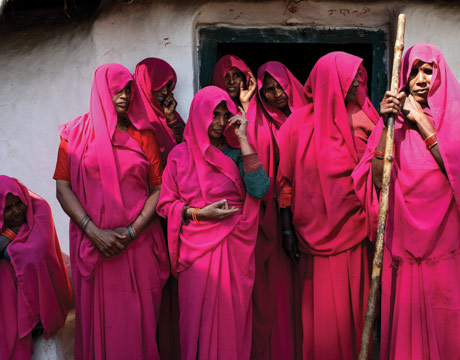
Domestic violence organizations often use helplines to reach a larger population, while providing an anonymous format to offer help. The Punjab Government implemented a community health helpline 20 days ago to assist in locating ultrasound and abortion centers in a similar endeavour to protect women’s human rights.
The Chandigarh Tribune reports that this helpline (number# 4005252) is part of a pilot project coordinated by the National Rural Health Mission and has already reported a successful intervention. An ultrasound/abortion center in Sirsa, Haryana is being investigated after an anonymous caller reported that a young woman of Mansa village had recently aborted a girl child. Through immediate action, officials found that name/location of the ultrasound and abortion center. Also, they found out that the young woman had been forced to have an abortion by her mother-in-law. Now both the center and mother-in-law are under police investigation. The young woman is not being investigated since she was forced into the abortion by her mother-in-law after already having a 7 month old daughter.
Anurag Aggarwal, mission director, National Rural Health Mission says,
“The hotline gives an opportunity to women to speak up in case they are being forced to get their female fetus aborted. If she is not able to say anything, her relatives or friends can inform us. The caller’s identity is not asked and the whole thing is anonymous.”
The helpline at 4005252 runs from 9am-6pm and gives residents an opportunity to air their grievances and make their suggestions on health services in the state. Through successful implementation, the helpline is a good tool for practical action on the female foeticide issue. I wonder if we could create a similar helpline in various Diaspora communities because the rates of female foeticide are also high outside of South Asia. What do you think?
In a recent piece on BBC Radio 4, titled Beyond Belief – Women in Sikhism, host Ernie Rea starts off with this statement,
“The Sikh religion is the world’s fifth largest… the men are often easily recognized – they wear turbans and leave their hair uncut. Â The fundamental message appears to be simple – God is one and all people are equal. Â But are some more equal than others? Â If the Sikh scriptures are consistent with a feminist agenda, why do some Sikh women feel like they are second class citizens?”
The host is joined by a panel of three women to discuss the issue of equality within the Sikh faith – Navtej Purewal, Lecturer in the School of Social Sciences at Manchester University; Eleanor Nesbitt, Professor Emeritus at the Institute of Education in the University of Warwick; and Nicky Guninder Kaur Singh, Professor in the Department of Religious Studies at Colby College.  The panelists did a great job of explaining what in fact Sikh scriptures say about equality and the role of women.  In addition, they helped identify the gaps that still exist between what is written and how it is practiced.  While these women speak predominately from an academic standpoint and not necessarily the community Sikh women’s voice, i think they brought forth a much important discussion for our community as a whole.  It was also quite eye-opening to hear the non-Sikh perception of our faith, represented by the host.
While parts of the conversation – often guided by host Ernie Rea – landed on discussions around topics that are common to this blog, (i.e. if Sikhi believes in equality, why does Panjab have the highest rates of female foeticide and if Sikhi is an egalitarian faith, why do men and women sit separately within the Gurdwara), the overall discussion was helpful as it raised questions that need to be addressed if changes are going to be made. Â The host began by asking whether or not the Sikh scripture does include a feminist agenda.
Purewal noted that the the Guru Granth Sahib was very revolutionary and, as far as doctrine, it does have the potential to be feminist.  However, due to social convention the message has not been actualized among Sikh communities, whether in India or within the diaspora.  Nesbitt suggested that since the scripture is predominately written in poetry, it is thus open to interpretation and that this is potentially the cause for much of the tensions felt by contemporary women.  Singh goes on to say that even the word “God” brings forth the notion of a male entity which is a starting point for many misconceptions and in fact, in the Guru Granth Sahib Ik Onkaar does speak to being gender-free.
 I read about this story and it just broke my heart. The details are tragic in and of themself, however, the indication that our community somehow failed this family is even more heartbreaking.
I read about this story and it just broke my heart. The details are tragic in and of themself, however, the indication that our community somehow failed this family is even more heartbreaking.
On February 21st, 2010 – Satnam Singh was shot to death by NYC police. A few days later his mother, Balbir Kaur, lay in a hospital bed recovering from being hit with a pan repeatedly by her son who suffered from a mental illness. When the NYC police arrived at the home – Satnam who had suffered an episode of an anxiety attack – was unable to articulate the situation. The police, seeing the mother bleeding on the couch – shot Satnam several times. He later died. Balbir Kaur’s other son, Lakhvinder Singh had in fact called the police. As he lay in a hospital bed preparing for treatment for a medical condition, he worried that he had not heard from his mother in some time. Their father, Bahadur Singh had recently traveled to Punjab and therefore, Balbir was alone at home with Satnam.
Balbir was the sole caretaker of her sons and husband. Satnam was suffering from a mental illness, Lakvinder was in a wheelchair after an accident, and Bahadur had his feet amputated due to gangrene infections. After the incident, Balbir lay in a hospital for days without a friend or family member by her side.
The local Punjabi language newspaper reports that since no one in the community knew the family, their suffering for years, including the latest episode, were unknown to anybody in Sikh circles. I somehow find it impossible to believe that the unfortunate family would never have visited any gurdwara the whole time they were there. Why did anybody not befriend them? Why was a support system not extended to them? Why was a newly migrant woman left to fend and care for her family of 3 disabled men on her own? [link]
It’s been a long time coming but Sikhs all across the globe seem to be making more of an effort to celebrate Lohri today, not only for their sons but also for their daughters. In Tarn Taran, Punjab, this year’s Lohri’s celebrations were dedicated to the 101 baby girls who live in the area.
“The main purpose of this celebration is to make people aware of the social evil of female foeticide. The male and female ratio is getting unbalanced with each passing day. In order to balance the gap in the Sikh society, Akal Takht has given order not to support female infanticide. Female foeticide is as bad as slaughtering a holy cow,” said Parvinder Singh. Chairman, Kalpana Chawla Pragtisheel Society.
::
Also in the news today is the story of Lak[h]winder Singh, a Giani in Kelowna, Canada who was arrested and is being charged for sexual exploitation, sexual interference, two counts of sexual assault and one count of assault. The allegations that give rise to the sexual offences began in late 2007 and the victim is now 16 years old.
Lakwinder Singh, the 29-year-old preacher at a Rutland temple, Gurdwara Guru Amandas Darbar, was arrested after a family with ties to the temple brought forward allegations of sexual impropriety to police last week.
Tarsem Singh, a spokesman for the Gurdwara, said Lakwinder Singh was employed at their temple for nearly seven years, but has since been fired. In addition, the gurdwara is supporting the police’s efforts in finding any other possible victims.
If Baldev Mutta’s cellphone rings in the middle of a meeting, he picks it up. If it beeps over dinnertime or at midnight, he answers it. And if he has to go out to pick up a woman and find her a spot at a shelter at 3 a.m., he will do it. “It can mean the difference between life and death for a woman,” said Mutta, executive director of Punjabi Community Health Services in Brampton. “They are abused and don’t have anywhere else to go. This agency is their lifeline.” [link]
The Punjabi Community Health Services is an organization based in Brampton, Canada which provides various services to Punjabi women who have been abused. Instead of waiting for women to turn up at their doorstep, this organization takes a proactive approach by sending workers into the community to speak with abused women. They visit Gurdwaras and community centers to find women in distress. At times they must speak with the women secretly at doctor’s appointments, grocery stores, even parking lots, so their families don’t find out.
::
 In related news, I recently read an article about the “Gulabi Gang” in an issue of Marie Claire which appeared on New America Media yesterday aswell. The Gulabi Gang are a group of women in India who have come together to fight against abuse. When local officials refused to take action against an alleged rapist, scores of pink-sari-clad women stormed the police station, demanding action – and thus, became know as the Gulabi Gang. For example, when Sampat Pal Devi learned that a friend had been beaten by her alcoholic husband and that the local police, chronically indifferent to violence against women, had looked the other way, something inside her snapped. In an effort to fight back, she gathered dozens of her female neighbors, armed them with sticks, and taught them how to fight back. Together, the self-declared Gulabi Gang have beaten up accused rapists, profligate officials, and husbands who’ve abandoned their wives.
In related news, I recently read an article about the “Gulabi Gang” in an issue of Marie Claire which appeared on New America Media yesterday aswell. The Gulabi Gang are a group of women in India who have come together to fight against abuse. When local officials refused to take action against an alleged rapist, scores of pink-sari-clad women stormed the police station, demanding action – and thus, became know as the Gulabi Gang. For example, when Sampat Pal Devi learned that a friend had been beaten by her alcoholic husband and that the local police, chronically indifferent to violence against women, had looked the other way, something inside her snapped. In an effort to fight back, she gathered dozens of her female neighbors, armed them with sticks, and taught them how to fight back. Together, the self-declared Gulabi Gang have beaten up accused rapists, profligate officials, and husbands who’ve abandoned their wives.
Recently, in Cheema Kalan village near Ludhiana, some well known Punjabi singers entertained to bring awareness of social problems like sex-selective abortion. Singers in attendance included Sarabjit Cheema, Jaspal Jassi, Babbu Mann, Jasbir Jassi and Inderjit Nikku. Why were these singers willing to take time out of their recording and busy performing schedules? Sarabit Cheema said:
problems like sex-selective abortion. Singers in attendance included Sarabjit Cheema, Jaspal Jassi, Babbu Mann, Jasbir Jassi and Inderjit Nikku. Why were these singers willing to take time out of their recording and busy performing schedules? Sarabit Cheema said:
Singers do have an ethical responsibility to spread meaningful messages among the people which helps bring a transformation in the society. We want the youngsters should listen and join us because usually they follow us after watching us on television. It is our duty to share consequential messages to the society which the youth will follow.
 Meanwhile, in Amritsar, a new-born girl was found abandoned in the Harmandir Sahib complex with a letter written by her mother, requesting that the girl be looked after.
Meanwhile, in Amritsar, a new-born girl was found abandoned in the Harmandir Sahib complex with a letter written by her mother, requesting that the girl be looked after.
“We have no option but to raise the girl,” SGPC secretary Dalmegh Singh said from Amritsar…
An SGPC official said the important thing to realise was “fate and her mother had willed the child to live” in a state where aborting girl children was rampant.
